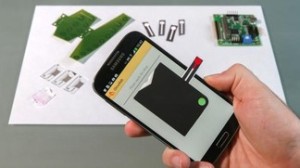Mar 18 2014
Using the properties of a smartphone screen to perform blood tests: the device developed by Qloudlab allows at-home analysis in less than a minute. The expanded diagnostics will be used to help people undergoing anticoagulant treatment.
 © 2014 Alain Herzog
© 2014 Alain Herzog
The use of anticoagulants has the effect of limiting the formation of blood clots in the veins, arteries or heart. But this treatment requires frequent monitoring of blood flow in the hospital. To overcome this constraint, Qloudlab, a start-up based in EPFL’s Microengineering Laboratory, is developing a test whose results can be read by a smartphone screen. The data can then be sent directly to a physician through an application. “Such a test will significantly improve the quality of life for people undergoing this kind of treatment,” said Arthur Queval, founder of the start-up.
Transformed into a mini-laboratory by a small single-use film, the smartphone reveals an indication of coagulation within a few dozen seconds. Still in development, the film deposited on the device is made of a microstructured plastic layer that is a few micrometers thick. A drop of blood enters by capillary action and comes into contact with a molecule initiating the coagulation process. But how does the phone read the results? It analyzes disruptions in the electric field, which is the surface of the iPhone or Samsung screens, for example – similar to what happens when you touch the screen with your finger. This change of the electric field produced by the path of the blood in the film is analyzed and interpreted with a specific app also developed by Qloudlab.
Since the wrong dosage of anticoagulants can cause cardiovascular complications, it is essential that people who take them are carefully monitored to prevent any inappropriate treatment. Self-monitoring devices, along the same lines as blood-sugar tests for diabetics, are currently arriving on the market. But the new tool developed by Qloudlab has the advantage that data can be sent directly to the doctor through the application. The specialist in possession of other data about the patient can then quickly estimate whether treatment should be modified.
The start-up has filed for a patent and has demonstrated the feasibility of the concept as well as the technology. They just received funding from Venture Kick that has enabled them to hire a biochemist. The three scientists have set the goal of 2015 to demonstrate that this new tool is as reliable as a laboratory test and thus can move to the industrialization phase and then commercialization.